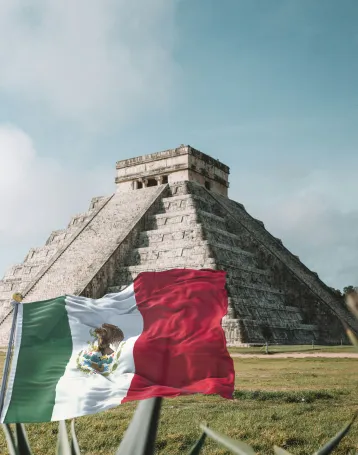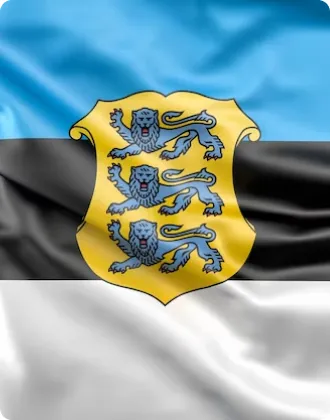
Gaming License in Mexico
Mexico is rapidly developing as a promising online gambling market. Gofaizen & Sherle offers comprehensive solutions for registering and operating a gambling business, including licensing, tax planning, legal strategy, and accounting support. We will provide you with full support at every licensing stage, helping you launch and grow your business in compliance with the law.
Despite certain legislative gaps, Mexico is one of the largest and most promising jurisdictions for online gambling in Latin America. Unlike countries with clearer regulations, the Mexican legal framework, created more than 15 years ago, needs modernization, causing a significant portion of operators to operate without a federal SEGOB license. AIEJA estimates that the illegal online betting market is valued at $450 million, with about 60% of platforms operating without authorization. According to AIEJA, about 60% of betting sites in 2024 were operating without a license, underscoring the need for updated and stronger regulations.
Nevertheless, the industry continues to grow. The country is attracting both local and international operators looking to capitalize on the population’s growing interest in online gambling. In 2023, the market strengthened due to technological advancements and an increasing number of participants. By 2028, the market is expected to grow by 70%, and revenue is expected to reach $4.63 million.
The Mexican government realizes the revenue potential from regulating and taxing online gambling. As the FIFA 2026 World Cup, which Mexico will co-host with Canada and the United States, approaches, the process of modernizing specialized regulations is accelerating. The market is expected to become more transparent and defined in the next two years, which will attract additional investors and operators to Mexican online gambling.

Advantages of Obtaining a Mexican Gaming License
Legality and protection from sanctions
Operators holding a license operate under federal law, which ensures the legality of their activities and protects them from possible sanctions from regulatory authorities. This avoids fines and other legal consequences associated with illegal activities.
Access to a broad market
Licensed operators can legally provide their services throughout Mexico, which provides access to a broad market of players. This is particularly important in light of the population’s growing interest in online gaming and the expected 70% increase in the market by 2028.
Relatively fast licensing process
The process of obtaining an online gambling license can take about 3 months from the time of application.
Increased player confidence
Having a license indicates that high standards of security and integrity are met, which increases player confidence. This can lead to a larger customer base and increased user loyalty.
Opportunities for partnerships and expansion
Licensed operators can enter into partnership agreements with other companies, including international partners, which facilitates business expansion and entry into new markets. This opens up additional opportunities for the company’s growth and development.
Stability and long-term perspective
Operators operating under the license can plan long-term activities and invest in development and innovation, which contributes to stability and sustainable business growth. This is especially important in a fast-growing online gambling market.
Opportunity to save on taxes
Licensed operators are liable to pay taxes, including income tax (ISR) at 30% and a special production and service tax (IEPS) of 30% on the amount of bets received from customers in a month. However, they may reduce the IEPS through state and local taxes paid during the same period, but not more than 20% of the total IEPS.
Overview of Gambling Regulation in Mexico
Gambling in Mexico is regulated at the federal level. The main regulations governing gambling are:
- Federal Law on Gambling and Lotteries (Ley Federal de Juegos y Sorteos) – the basic law, adopted in 1947, prohibiting gambling except for certain types of gambling.
- Regulation of the Federal Gambling and Lotteries Act (Reglamento de la Ley Federal de Juegos y Sorteos) – a regulation that details the provisions of the law, including the regulation of online gambling.
The Ministry of the Interior (Secretaría de Gobernación, SEGOB) and its General Directorate of Games and Raffles (Dirección General de Juegos y Sorteos) are responsible for issuing licenses and supervising operators in this jurisdiction.
Under a 1947 Federal Law, all forms of gambling are prohibited in Mexico except those specifically authorized. Those authorized include:
- lotteries and raffles in which the outcome is determined by chance;
- sports betting, including racing and team sports;
- billiards, bowling, chess, checkers, and other activities that do not depend solely on luck;
- casinos and bookmakers with the appropriate license.
Online gambling is officially permitted, but only within licensed operators who must comply with legal requirements.
To operate a gambling business in Mexico, a license must be obtained from SEGOB. However, new licenses are rarely issued, so most operators work through a sub-licensing model. This means that international and local companies enter into agreements with already licensed organizations to legally provide services in the country.
The main restrictions and requirements for licensed operators are as follows:
- license holders must comply with tax legislation and provide reports on their activities;
- online gambling activities require a separate authorization to launch a platform;
- promotion and advertising of gambling activities require special authorization from regulatory authorities;
- promotions and bonus offers also require separate authorization;
- online operators are required to ensure transparency of transactions and fraud prevention.
The regulation of online gambling in Mexico remains complex and ambiguous. The 1947 law did not contain provisions relating to internet gambling, so the government uses clarifications and bylaws to adapt the legislation to modern realities. Operators licensed to operate land-based games may offer online betting and casino games if their permit allows them to do so. However, a significant part of the market is occupied by international companies accepting players from Mexico without a local license.
Despite attempts to tighten control over the online segment, there is currently no harsh crackdown on offshore operators. The authorities are working on modernizing the legislation to establish clear rules for regulating online casinos and betting platforms.

Request more information about the Mexican Gaming License
Entities that regulate gambling and social games
| Game type | Regulatory body | |
|---|---|---|
| online | ground | |
| Gambling | Department of the Interior through the Bureau of Gaming and Lotteries | |
| Casino (roulette, blackjack) | Adjustable | Adjustable |
| Poker | Adjustable | Adjustable |
| Bingo | Adjustable | Adjustable |
| Bets | Department of the Interior through the Bureau of Gaming and Lotteries | |
| Sports betting/racing | Adjustable | Adjustable |
| Fantasy Bets | Not adjustable | Not adjustable |
| Lotteries | The Mexican state lottery is regulated by the National Lottery of Public Assistance (Lotería Nacional para la Asistencia Pública).
Private lotteries require authorization from the Ministry of the Interior through the Bureau of Gaming and Lotteries. |
|
| Social/skill games | Department of the Interior through the Bureau of Gaming and Lotteries | |
| Agility games and competitions | Not regulated if no cash bets are available | Not regulated if no cash bets are available |
| Social games that are irregular and occur in private homes purely for entertainment or as a casual pastime. | Not regulated if no cash bets are available | Not regulated if no cash bets are available |
Requirements for obtaining a Mexican gambling license
The online gambling license is issued by the Ministry of the Interior (SEGOB) and applies exclusively to operators who meet the legal requirements.
The main requirements for obtaining a license are:
- Availability of a land-based license – online gambling is only possible as an addition to a land-based license;
- Legal status and financial stability – the license is issued only to companies registered in Mexico, which can prove their financial solvency and willingness to invest in the gambling business. Foreign companies cannot obtain such a license on their own but can operate through local legal entities;
- Internal control system – requires the implementation of a system that records data on accounts, personal information of players, time and amounts of transactions, as well as guarantees transparency and prevents manipulation;
- SEGOB approval – the description of online betting procedures as well as control systems must be pre-approved by the Ministry of Interior;
- Responsible gaming – operators are obliged to comply with the principles of responsible advertising, train staff, provide players with information on responsible gaming, and cooperate with the National Commission for Combating Addictions (CONADIC);
- Compliance with AML measures – licensees must comply with the Anti-Money Laundering (AML) Act, including implementing KYC procedures, limiting cash transactions, appointing a responsible officer, and maintaining records;
- Technical requirements – platforms must be technically prepared to comply with all legal requirements (e.g., age control of users).
Additional aspects:
- the use of virtual currencies is allowed if it complies with AML and regulatory standards;
- the license only covers activities within Mexico, but there are no prohibitions on foreign players;
- any advertising and promotion of gambling requires separate authorization from SEGOB and must comply with transparency and accuracy requirements.
These measures ensure transparency, security, and legal compliance in the organization of online gambling in Mexico.
Types of gambling licenses in Mexico
In Mexico, obtaining a gambling license, including online gambling, is regulated through four main categories of licenses, each covering a different type of activity.
- A license to open and operate large facilities.
This type of license includes the ability to operate betting centers, betting shops, and land-based casinos. Online gambling also falls under this license, as it is often associated with land-based establishments or remote betting centers. Only companies registered under Mexican law can obtain such licenses.
- Fairgrounds Gambling License.
Refers to temporary authorization to conduct gambling at large national events such as the Feria Nacional de San Marcos. Although not directly related to online gambling, such licenses may be of interest to operators seeking to combine land-based and virtual formats.
- Temporary Facilities License.
Designed for temporary gambling activities such as betting on cockfights or temporary racecourses. It is not directly related to online gambling but can be used as an add-on to diversify the operator’s offering.
- Lotteries license.
This license covers both traditional lotteries and their online versions, making it important for operators wishing to integrate lottery products into their platforms.
To obtain a license related to online gambling, it must be taken into account that in most cases, a bundle with land-based activities will be required. Moreover, betting shops and land-based casinos, which are often linked to online gambling, require additional authorization from local authorities. This makes the licensing process heterogeneous and dependent on local conditions.
Thus, it is important for online gambling operators to determine which type of license is appropriate for their operations and to consider the need to comply with local regulations and procedures. The experts at Gofaizen & Sherle can help you with this task.
Procedure for obtaining a gambling licence in Mexico
Obtaining an online gambling license in Mexico requires strict requirements and extensive documentation. Since there is no direct regulation of online casinos, operators must obtain a license for betting shops and land-based casinos, which covers remote forms of gambling. The licensing process includes the following steps:
Registration of a legal entity.
Step 1
The license applicant must be a Mexican legal entity registered under the Corporations and Partnerships Law. At this stage, the company is created, the articles of incorporation are executed, and the ownership structure is determined.
Preparation of the application package.
Step 2
The following documents are required to be collected for the application:
Documents about the company and its owners
- constituent documents of the company and their amendments;
- financial statements and balance sheets;
- data on shareholders and key personnel (name, citizenship, address, financial statements, biography, credit history);
- declaration of absence of criminal record and bankruptcies;
- information on business relations with other licensed operators.
Documents confirming compliance with fair play requirements
- Company policy on responsible gambling;
- Procedures to protect players from addiction;
- Measures to ensure fair play and protection of user data;
- Random Number Generation (RNG) algorithms and mechanisms and their certification by an independent laboratory.
AML compliance and financial security documents
- Anti-Money Laundering (AML) and Countering the Financing of Terrorism (CFT) policies;
- customer identification and verification (KYC) procedures;
- suspicious transaction monitoring programs;
- designating of a responsible AML compliance officer.
Documents issued outside of Mexico must be apostilled and translated into Spanish.
Filing with the Bureau.
Step 3
The set of documents is submitted to the Bureau’s central office in Mexico City. If necessary, the Bureau may request additional information. The application must meet all the criteria. Otherwise, the licensing process may be delayed.
Review of the application and verification of the company.
Step 4
The Bureau analyzes information about the applicant, focusing on the transparency of the ownership structure (UBO), financial stability, shareholder goodwill, and corporate governance.
Obtaining a license and publishing the data.
Step 5
Upon successful review, the application is approved, and a summary of the license is published on the official website of the Bureau. The operator can start operating by the license.
On average, the process of obtaining an online gambling license takes about 3 months from the moment of submitting the complete set of documents.
Explore more information about the Mexican Gambling License
Gambling Lawyers in Mexico

Position
Senior Associate, Business Development Manager (FX & iGaming)Phone
+372 5477 0344
Position
Senior Associate, Head of Sales (FX and iGaming)Phone
+372 5300 1858Taxation
In Mexico, online gambling operators are required to pay several types of taxes and fees, including state, federal, and local fees.
State fees.
License holders must pay between 1% and 2% of the revenue generated from all bets placed on sporting events, horse racing, dog racing and other games of chance. The rate depends on the type of license and conditions imposed by the Bureau.
Income Tax (ISR).
Licensed operators registered as legal entities or individuals with a permanent establishment in Mexico are required to pay income tax at a rate of 30% on total annual income earned in the country. Allowable tax deductions may be taken into account when calculating the tax base.
Special Production and Services Tax (IEPS).
An additional tax of 30% is levied on the amount of rates received from customers for the month. However, it can be reduced by:
- state levies paid in the same period;
- local taxes, but not more than 20% of the total IEPS.
Local taxes.
The amount of additional taxes depends on the specific Mexican state where the operator is registered. Some regions levy fees on licensed companies or casino users.

Liability for violation of requirements and laws
In Mexico, violations of gambling laws can result in various penalties.
Administrative penalties.
- fines – from 100 to 10,000 Mexican pesos (approximately US$4.85 to US$485);
- suspension – suspension for up to one year for players, referees, bookmakers, and others involved;
- license revocation – applied for repeated violations (two or more times within a year);
- closure of the establishment – final termination of activity in case of repeated violations.
Criminal penalties.
Organization of illegal gambling
- imprisonment from 3 months to 3 years;
- a fine of 500 to 10,000 Mexican pesos ($24 to $485).
Renting or attending illegal gambling premises
- imprisonment from 1 month to 2 years;
- a fine of 100 to 5,000 Mexican pesos ($4.85 to $242);
- confiscation of property – seizure of money, equipment, and other items used in illegal gambling;
- immediate closure of the establishment if it operates without a license.
Thus, Mexican legislation strictly regulates the sphere of gambling, and violation of the requirements can have serious consequences – from financial losses to criminal liability and business closure.
Conclusion
Online gambling licensing in Mexico is regulated by the Ministry of the Interior (SEGOB) and requires compliance with strict requirements, including a land-based license, financial stability, and an internal control system. The process of obtaining a license can take up to 3 months and requires the preparation of an extensive set of documents. Operators must comply with tax obligations, including government levies, income tax, and special taxes, which can be challenging for foreign companies.
Gofaizen & Sherle specializes in assisting you in obtaining online gambling licenses in various jurisdictions. By contacting them, you will receive professional support at every stage of the process, including the preparation of the necessary documents and interaction with regulators. This will allow you to focus on growing your business, minimizing risks and ensuring compliance with all legal requirements.
FAQ about obtaining a gaming license in Mexico
How long does it take to obtain a gambling license in Mexico?
In Mexico, the process of obtaining an online gambling license can take up to 3 months.
Can a foreign company obtain a gaming license in Mexico?
According to Mexican law, a legal entity must be registered in Mexico to obtain an online casino license. Foreign companies cannot get such a license directly but can work through local legal entities.
What types of games can be licensed in Mexico?
Today, various types of gambling are allowed in Mexico, including casino games, video slots, bingo, and sports betting.
Explore other Gaming Licenses
Connect with our experts
Our experts will tell you how to do it as quickly and easily as possible.
By clicking the button, I confirm that I have read the privacy policy and consent to the collection and processing of my personal data in accordance with the GDPR rules.
to our news & insights







